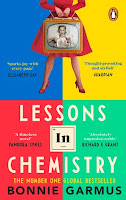From Test Tubes to TV
Chemist Elizabeth Zott is in a research laboratory at a time when women are supposed to be married and at home, cooking pot roasts and raising children. Worse than that, she's brilliant at what she does, making her a target for misogyny, jealousy and downright hatred from colleagues and bosses male and female (but especially male). Forced out of her job, a chance encounter leads to a presenting role on 'Supper at Six', a tea-time cookery show designed to fill a dead slot in the network's afternoon schedule. But once a chemist, always a chemist, and Elizabeth refuses to talk down to her housewife audience, using science to explain her how her recipes work. She's a hit with viewers everywhere, but how long does she have when she refuses to bow to convention?
The Lady in the Lab
Elizabeth Zott is a brilliant character. Forget Bridget Jones or Lizzie Bennet, I related to this woman far more than any other popular female character I've ever read. Don't get me wrong, she'd be a nightmare to live with, but she's intelligent, logical, single-minded, determined and entertaining, and I rooted for her from beginning to end. She faces some brutal experiences and comes out fighting, refusing to change without good reason, questioning the infallibility of society's status quo in a way that we really all should. Perhaps if we asked 'why' more often there would be less nonsense in the world.
Community Bonds
I also loved spending time with the characters around Elizabeth, from the wonderful dog Six-Thirty to young Mad to poor, put-upon Walter Pine... pretty much everyone, really! It would've been so easy to reduce some to caractures (especially the 'villains', for want of a better polite term to use) and make all the men 'bad' and the women 'good', but the writer clearly understands that prejudice often comes from misplaced fear and vulnerability on the part of the aggressor. It means she's able to reflect a whole spectrum of sexism and misogyny through the characters, many of whom would probably never realise they are part of the problem.
Layers and Connections
The thing that impressed me most was how deftly Ms Garmus manages to juggle so many layers and connections in plots, characteristics and behaviours consistently and meaningfully across the book. I've seen it done in short stories, but it's so much rarer in a full length novel. She must have an amazing brain - or an awful lot of sticky notes!
Not Just for Girls
Like Elizabeth herself, 'Lessons in Chemistry' should defy convention. Too often, books with female protagonists are automatically considered 'chick lit' and therefore not read by men. I hope this is not one of them. I believe there is much to entertain and inform both men and women in this book. Anyone who assumes it's going to be 386 pages of man-bashing are letting their prejudices get in the way of a real treat and doing a disservice to the author and her ability to write both positive and negative male and female characters.
Overall
I put off reading this book but then I received a personal recommendation that I couldn't ignore from someone I trusted. I hope I can do the same for you. 'Lessons in Chemistry' is the best debut novel I've ever read. It's funny and heartfelt, violent and bold. It's the story of an era that too many of us have forgotten and a woman who we never shall.
Now, what next..?
'Lessons in Chemistry' by Bonnie Garmus was published in 2022 by Penguin Books. This review is based on the paperback, published in 2023. Note that the book contains scenes of rape and serious sexual assault and deals with grief. Chick lit it is not.
